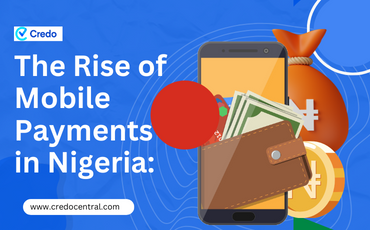A brief stat on the rise of cashless kings, Exploring the future of mobile payments in Nigeria.

Introduction
Nigeria is witnessing a significant transformation in its digital payment landscape, spearheaded by the surge in mobile payments. Projections indicate a 12.81% market growth from 2024 to 2027, with an anticipated volume of US$31.96 billion by 2027. This growth is propelled by the expanding presence of smartphones, constituting 44% of all mobile phones in the country. However, this journey is not without obstacles, including issues like fraud, high costs, and inadequate infrastructure.
The Growth of Mobile Payments in Nigeria
With a 65% penetration rate among Nigerians, mobile technology indicates a clear preference for mobile payments. Mobile money ownership witnessed a rise from 16% to 22% in 2022, and the transaction volume doubled to approximately 800 million in 2020. This growth extends beyond Nigeria’s borders, influencing the entire West African region positively.
The Role of Telecom Companies and Fintechs

Telecom companies have been a major catalyst for payments growth in Africa through mobile money (The Conversation, 2022). However, fintechs are becoming increasingly relevant, contributing to the mass adoption of mobile money (The Conversation, 2022). The surge in mobile transactions in Nigeria, which hit N9.2 trillion in the first seven months of 2022, underscores the importance of mobile transactions (Punch Newspapers, 2022).
The Challenges of Mobile Payments in Nigeria
Despite the promising growth, the mobile money system in Nigeria faces several challenges. Fraud, insecurity, high costs, and poor infrastructure are among the major issues (The Conversation, 2022). For instance, there have been instances where agents charge more than the maximum fee of N2,000.00 (US$2.44) due to the lack of monitoring, especially in areas with little or no competition (The Conversation, 2022).
Poor infrastructure remains a significant challenge, with some agents switching developers due to the lack of a reliable support system (The Conversation, 2022). Internet connectivity is another issue, with only 37% of Nigerians having access to the internet (Statista, 2023).
The Future of Mobile Payments in Nigeria
The future of mobile payments in Nigeria looks promising, with several factors contributing to its growth. The increasing smartphone penetration, the growing adoption of mobile money, and the government’s support for digital payments are all positive indicators (Statista, 2023). Additionally, the Central Bank of Nigeria’s (CBN) efforts to promote financial inclusion and cashless transactions are expected to further drive the growth of mobile payments (Punch Newspapers, 2022).
Conclusion
The rise of mobile payments in Nigeria is a testament to the country’s digital progress. While challenges exist, the potential for growth is immense, offering substantial opportunities for global brands to expand their presence, and part of this can achieved using some social media tools. As the landscape continues to evolve, it’s crucial for stakeholders to address the existing challenges and optimize their platforms for better visibility and user experience.
Recommendations for Optimizing Mobile Payments in Nigeria
To further accelerate the growth of mobile payments in Nigeria, several recommendations can be made:
Improve infrastructure: The government and telecommunications companies should invest in improving internet connectivity and infrastructure to ensure reliable and affordable access for all Nigerians.
Address security concerns: The CBN and other relevant authorities should implement robust security measures to protect users from fraud and cybercrime.
Promote financial literacy: The government and financial institutions should collaborate to educate Nigerians about the benefits and risks of mobile payments, as well as how to use them safely and securely.
Encourage competition: The CBN should encourage competition among mobile money providers to drive down costs and improve services.
Support innovation: The government and financial institutions should support fintechs and other innovators to develop new and innovative mobile payment solutions tailored to the needs of Nigerians.
By addressing these challenges and implementing these recommendations, Nigeria can unlock the full potential of mobile payments and drive economic growth and financial inclusion.
Citations:



